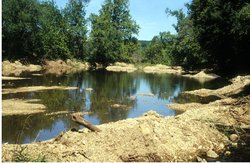Crushed stone
| Topics: |
Geology (main)
|
Contents
Background
 Gravel mining site near Sellars creek, Missouri. (Source: United States Geological Survey)
Gravel mining site near Sellars creek, Missouri. (Source: United States Geological Survey) In industry, two types of "stone" are quarried, processed, and sold as commodities: they are known as crushed stone and dimension stone.
Crushed stone is any type of natural rock that, in order to be mined, has to be first blasted from its natural state in the ground, and then processed (crushed and screened). The most common types of stone processed into crushed stone include limestone and dolomite, granite, and traprock. Smaller amounts of marble, slate, sandstone, quartzite, and volcanic cinder are also used.
Sources
Crushed stone is produced in almost every state in the U.S. The type of crushed stone mined from any particular state depends on the general geology and rocks of the state. For instance, crushed limestone and dolomite are typical in Indiana, Illinois and Ohio, marble and granite from Vermont, etc. Even though it is quarried and processed all over the United States, a small number of states account for more than half of the total crushed stone production. These states, in decreasing order of amount of stone produced, are Texas, Pennsylvania, Florida, Georgia, Illinois, Missouri, Ohio, North Carolina, Virginia and Tennessee. Most states are now recycling asphalt as well as concrete roads and structures by crushing these materials and using them in new road construction projects.
The United States does import small amounts of crushed stone. Most is imported from Canada, followed by Mexico, The Bahamas, and other countries. Crushed stone resources worldwide are large. However, high-quality stone, such as some limestone and dolomite used for very special purposes, are more limited to specific regions.
Uses
Crushed stone is used mostly as aggregate for road construction and maintenance. It is also used for making cement and lime and other chemical applications, and in agriculture. There are other uses for crushed stone, many of which are not accurately or completely reported.
Substitutes and Alternative Sources
Stone resources in the world are large and crushed stone should never be in short supply. However, if necessary, crushed stone substitutes for road building include sand and gravel, and slag. Substitutes for crushed stone used as construction aggregates include sand and gravel, slag, sintered or expanded clay or shale, and perlite or vermiculite.
Further Reading
- Common Minerals and Their Uses, Mineral Information Institute.
- More than 170 Mineral Photographs, Mineral Information Institute.
| Disclaimer: This article is taken wholly from, or contains information that was originally published by, the Mineral Information Institute. Topic editors and authors for the Encyclopedia of Earth may have edited its content or added new information. The use of information from the Mineral Information Institute should not be construed as support for or endorsement by that organization for any new information added by EoE personnel, or for any editing of the original content. |